June 8, 2025 | 05:42 GMT +7
June 8, 2025 | 05:42 GMT +7
Hotline: 0913.378.918
June 8, 2025 | 05:42 GMT +7
Hotline: 0913.378.918
Mr. Lo Van Phinh of Na Ca village, Dong Xa commune, Na Ri district, Bac Kan province, grew ginger in an unplanned way for twenty years. After harvesting, he had to deliver the ginger by motorcycle to his consumers in the Bac Kan city suburbs 40km afar, where prices were unstable. However, since 2020, CSSP Project has assisted him in earning a greater and more steady income.
Mr. Phinh said that ginger growers used to hoe up and sow ginger seeds into the soil, but when it rained, 20-30 percent of the plants would succumb. Since they were directed and instructed by technical experts from seeding through care, fertilization, dry straw composting, and harvesting, they were able to get the greatest results.
"I plant according to the formula 2 rows 1 bed, so plants no longer get waterlogged and weeding and fertilizing are simplified. When harvesting is simpler, gingers are larger, resulting in a yield that is more than 1.5 times greater than previously."
CSSP Project has partnered with the Japanese Misaki Vietnam Company, which operates in Bac Kan's Thanh Binh Industrial Zone. The firm underwrites products for farmers at VND 7,000 per kilogram, and they come to the garden to buy so that the production is stable and farmers do not have to be concerned about price squeeze by merchants as before.
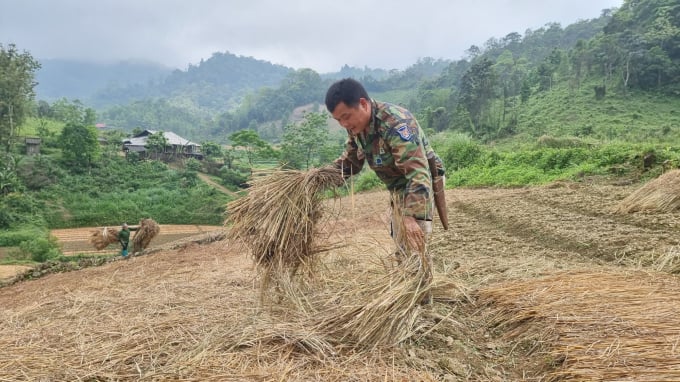
Mr. Lo Van Phinh from Na Ca village, Dong Xa commune, Na Ri district is spreading straw to cover the ginger bed according to technical instructions of the Bac Kan CSSP staff. Photo: TN.
The firm underwrites products for farmers at VND 7,000 per kilogram, and they come to the garden to buy so that the production is stable and farmers do not have to be concerned about price squeeze by merchants as before. In 2021, I cultivated 4,000 m2, which earned around VND 150 million, and created a profit of VND 120 million after subtracting other expenses. This year, at Misaki's request, I decided to expand the space to 5,000 square meters", Mr. Phinh said.
Similar to Phinh, Ms. Nong Thi Men in Ca Na village planted 2,000 m2 of ginger with the use of technological and scientific techniques, double the previous harvest's productivity. After harvesting, Ms. Men earned VND 80 million in income, including a profit of VND 60 million. Ms. Men got so ecstatic and confident in the guidance of the CSSP Project's technical personnel and linking business.
Mr. Nong Van Dong, chairman of the Dong Xa communal People's Committee, noted that the execution of the CSSP Project has improved the quality of life for hundreds of local families. The investment in expanding the number of roads connecting with highland villages facilitates trade; linking production along the value chain of ginger and palanquin plants according to the right techniques and in the direction of goods, combined with product consumption, has resulted in a substantial increase in the income of the populace. Additionally, many families have access to project financing for industrial investments.
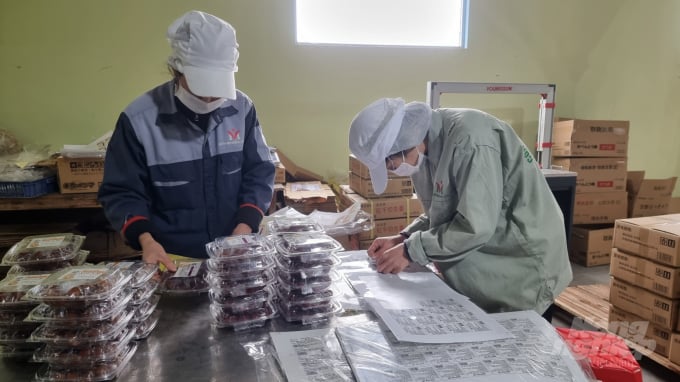
The products that the project supports farmers in Bac Kan province in association with Misaki Company are produced into finished products for export to Japan. Photo: TN.
In addition to Dong Xa commune, the target communes of the CSSP Project in Bac Kan province achieved efficiency by constructing major commodity regions along high-value chains. These include Ba Be fragrant gourd, with a production scale of more than 122ha and an output of approximately 5,000 tons; sticky turmeric with an area of up to 250ha, of which output reaches 5,000 tons and generates outstanding products such as Bac Kan red sticky turmeric starch, Bac Kan black sticky turmeric starch, Vi-cumax nano curcumin, and Trinh Nang curcumin (all of which meet the provincial 4-star OCOP product standards); and numerous other types of production (raising fattening cattle, black pigs, free-range chickens, galangal...). The aforementioned elements have enabled Bac Kan province's goods to reach the home market, therefore assuring export quality to demanding overseas markets like Europe and Japan.
The CSSP Project has fostered the province of Bac Kan in orienting production to the emphasis and strength of each locality and creating a commodities zone with sufficient competitive capacity for domestic and international markets. People support the programs of the CSSP Project conducted in the province of Bac Kan because the producers are connected with enterprises consuming goods, so assuring market stability between supply and demand without the previous concern of devaluation.
Translated by Linh Linh
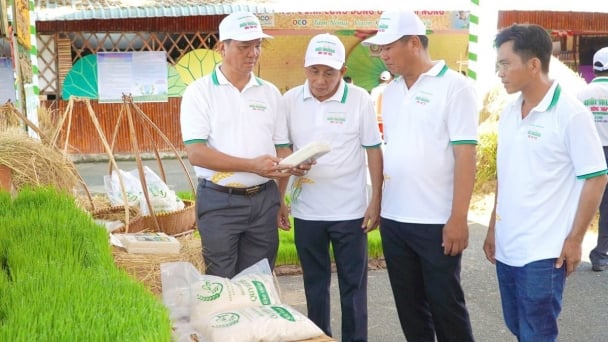
(VAN) Dong Thap has launched a meeting in response to the Action Month for the Environment under the theme 'Live Green - Join Hands for a Green Economy' at Tram Chim National Park.
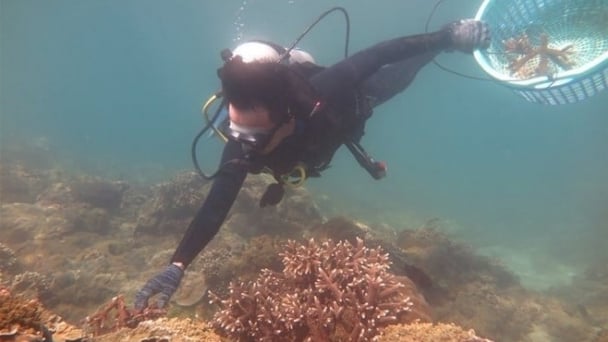
(VAN) The ocean has the capacity to absorb millions of tons of carbon, provided that mangrove forests, coral reefs, and biodiversity are protected.
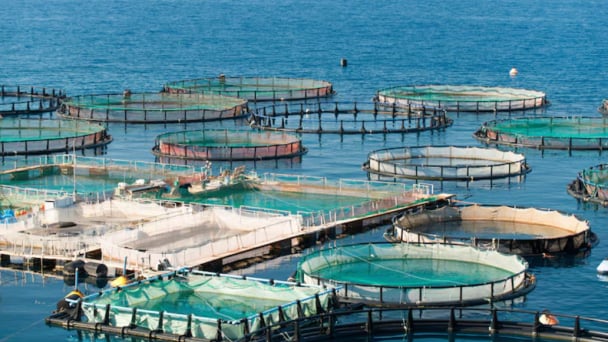
(VAN) Technology is redrawing the map of Vietnamese aquaculture: more modern, greener, and more sustainable.

(VAN) Novel process harnesses machine learning to reveal groups of genes that determine how efficiently plants use nitrogen.

(VAN) Several scientists and farmers are experimenting with soil treatment in some key durian-growing regions such as Cai Lay (Tien Giang), Dak Song, Gia Nghia, and Dak R’lap (Dak Nong).
/2025/05/25/4127-3-073637_820.jpg)
(VAN) Thanks to the promotion from an FAO-implemented project, vegetable production in greenhouses in Moc Chau has seen strong development, from 1.5 hectares in 2021 to nearly 50 hectares in 2024.

(VAN) FAO has recently supported USD 140,000 to implement the project 'Risk mitigation human-animal interface risks through disease control initiatives in pig farming.'